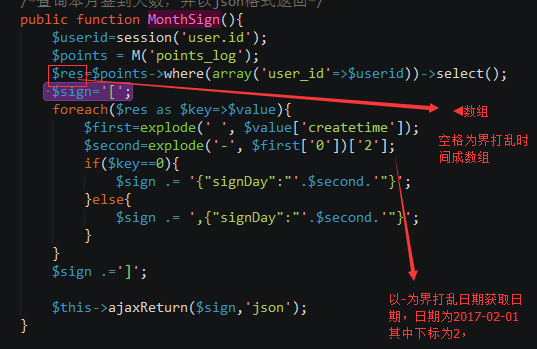How to implement calendar check-in in php js
php js method to implement calendar check-in: first create the front-end code "$(".ser_mbx").click(function(){...}"; then create the back-end PHP code "$this-> ;assign('res',$res);"; Finally, write the sign-in into the database.

The operating environment of this tutorial: windows7 system, PHP7. Version 1, DELL G3 computer
php mysql jquery implements calendar check-in function
In the process of website development, we often use the check-in function to reward user points, or do Some other activities. I did a calendar sign-in during the project development process. Because I had no experience, I took a lot of detours and recorded the process and steps again.
1. Calendar sign-in style:

2. This check-in only records the number of check-ins this month. If you want to query, you can write other pages to query all check-in records. (The function is available, but it is very troublesome. It is not available in the past. Do.)
3. Front-end code
<include file="Public:menu" />
<style type="text/css">
*{margin:0;padding:0;font:14px/1.8 "Helvetica Neue","microsoft yahei";}
</style>
<p class="ser_bx">
<p class="ser_bxc">
<span style="color:#5381B5;">签到记录</span>
<if condition="$res['0']['points'] eq '5'">
<p class="already btn_center">已签到</p>
<else />
<p class="ser_mbx btn_center">立即签到</p>
</if>
<p class="already btn_center" style="display:none;">已签到</p>
<!--<p class="minein">积分 : <span style="color:#b81d25">{$poin.points}</span></p>-->
</p>
</p>
<p class="check_box">
<p style="width:500px;height:400px;margin:0 auto;">
<p style="width:300px;height:300px;margin-left:50px;" id="calendar"></p>
</p>
</p>
<script type="text/javascript">
$(document).ready(function(){
$(".ser_mbx").click(function(){
$.ajax({
url:"{:U('Index/Checkin')}",
type:'POST',
datatype:"json",
success:function(msg){
$(".already").show();
$(".ser_mbx").hide();
MonthSign();
}
});
});
});
</script>
<script type="text/javascript" language="javascript">
$(document).ready(function(){
MonthSign();
});
function MonthSign(){
//ajax获取日历json数据
$.ajax({
url:"{:U('Index/MonthSign')}",
type:'POST',
datatype:"json",
success:function(msg){
//alert(msg);
/*var signList=[{"signDay":"10"},{"signDay":"11"},{"signDay":"12"},{"signDay":"13"}];
*/
calUtil.init(JSON.parse(msg));
}
});
}
</script>
<script type="text/javascript">
var calUtil = {
//当前日历显示的年份
showYear:2015,
//当前日历显示的月份
showMonth:1,
//当前日历显示的天数
showDays:1,
eventName:"load",
//初始化日历
init:function(signList){
calUtil.setMonthAndDay();
calUtil.draw(signList);
calUtil.bindEnvent();
},
draw:function(signList){
//绑定日历
var str = calUtil.drawCal(calUtil.showYear,calUtil.showMonth,signList);
$("#calendar").html(str);
//绑定日历表头
var calendarName=calUtil.showYear+"年"+calUtil.showMonth+"月";
$(".calendar_month_span").html(calendarName);
},
//绑定事件
bindEnvent:function(){
//绑定上个月事件
$(".calendar_month_prev").click(function(){
//ajax获取日历json数据
/*var signList=[{"signDay":"10"},{"signDay":"11"},{"signDay":"12"},{"signDay":"13"}];
calUtil.eventName="prev";
calUtil.init(signList);*/
});
//绑定下个月事件
$(".calendar_month_next").click(function(){
//ajax获取日历json数据
/*var signList=[{"signDay":"10"},{"signDay":"11"},{"signDay":"12"},{"signDay":"13"}];
calUtil.eventName="next";
calUtil.init(signList);*/
});
},
//获取当前选择的年月
setMonthAndDay:function(){
switch(calUtil.eventName)
{
case "load":
var current = new Date();
calUtil.showYear=current.getFullYear();
calUtil.showMonth=current.getMonth() + 1;
break;
case "prev":
var nowMonth=$(".calendar_month_span").html().split("年")[1].split("月")[0];
calUtil.showMonth=parseInt(nowMonth)-1;
if(calUtil.showMonth==0)
{
calUtil.showMonth=12;
calUtil.showYear-=1;
}
break;
case "next":
var nowMonth=$(".calendar_month_span").html().split("年")[1].split("月")[0];
calUtil.showMonth=parseInt(nowMonth)+1;
if(calUtil.showMonth==13)
{
calUtil.showMonth=1;
calUtil.showYear+=1;
}
break;
}
},
getDaysInmonth : function(iMonth, iYear){
var dPrevDate = new Date(iYear, iMonth, 0);
return dPrevDate.getDate();
},
bulidCal : function(iYear, iMonth) {
var aMonth = new Array();
aMonth[0] = new Array(7);
aMonth[1] = new Array(7);
aMonth[2] = new Array(7);
aMonth[3] = new Array(7);
aMonth[4] = new Array(7);
aMonth[5] = new Array(7);
aMonth[6] = new Array(7);
var dCalDate = new Date(iYear, iMonth - 1, 1);
var iDayOfFirst = dCalDate.getDay();
var iDaysInMonth = calUtil.getDaysInmonth(iMonth, iYear);
var iVarDate = 1;
var d, w;
aMonth[0][0] = "日";
aMonth[0][1] = "一";
aMonth[0][2] = "二";
aMonth[0][3] = "三";
aMonth[0][4] = "四";
aMonth[0][5] = "五";
aMonth[0][6] = "六";
for (d = iDayOfFirst; d < 7; d++) {
aMonth[1][d] = iVarDate;
iVarDate++;
}
for (w = 2; w < 7; w++) {
for (d = 0; d < 7; d++) {
if (iVarDate <= iDaysInMonth) {
aMonth[w][d] = iVarDate;
iVarDate++;
}
}
}
return aMonth;
},
ifHasSigned : function(signList,day){
var signed = false;
$.each(signList,function(index,item){
if(item.signDay == day) {
signed = true;
return false;
}
});
return signed ;
},
drawCal : function(iYear, iMonth ,signList) {
var myMonth = calUtil.bulidCal(iYear, iMonth);
var htmls = new Array();
htmls.push("<p class='sign_main' id='sign_layer'>");
htmls.push("<p class='sign_succ_calendar_title'>");
htmls.push("<p class='calendar_month_span'></p>");
htmls.push("</p>");
htmls.push("<p class='sign' id='sign_cal'>");
htmls.push("<table>");
htmls.push("<tr>");
htmls.push("<th>" + myMonth[0][0] + "</th>");
htmls.push("<th>" + myMonth[0][1] + "</th>");
htmls.push("<th>" + myMonth[0][2] + "</th>");
htmls.push("<th>" + myMonth[0][3] + "</th>");
htmls.push("<th>" + myMonth[0][4] + "</th>");
htmls.push("<th>" + myMonth[0][5] + "</th>");
htmls.push("<th>" + myMonth[0][6] + "</th>");
htmls.push("</tr>");
var d, w;
for (w = 1; w < 7; w++) {
htmls.push("<tr>");
for (d = 0; d < 7; d++) {
var ifHasSigned = calUtil.ifHasSigned(signList,myMonth[w][d]);
console.log(ifHasSigned);
if(ifHasSigned){
htmls.push("<td class='on'>" + (!isNaN(myMonth[w][d]) ? myMonth[w][d] : " ") + "</td>");
} else {
htmls.push("<td>" + (!isNaN(myMonth[w][d]) ? myMonth[w][d] : " ") + "</td>");
}
}
htmls.push("</tr>");
}
htmls.push("</table>");
htmls.push("</p>");
htmls.push("</p>");
return htmls.join('');
}
};
</script>
<include file="Public:footer" />4. Back-end code: Query whether to check in today:
$points = M('points_log');
$userid=session('user.id');
$begintime=date("Y-m-d H:i:s",mktime(0,0,0,date('m'),date('d'),date('Y')));
$endtime=date("Y-m-d H:i:s",mktime(0,0,0,date('m'),date('d')+1,date('Y'))-1);
$where=array(
'points'=>'5',
'user_id'=>$userid,
'createtime' => array(array('gt',$begintime),array('lt',$endtime)),
);
$res=$points->where($where)->order("createtime desc")->select();
//var_dump($res['0']['points']);
$this->assign('res',$res);5. Query points:
/*查询积分*/
$jfen=M(cuser);
$list=$jfen->where(array('id'=>$userid))->field('points')->find();
$preg = '/[0]*/';
$poin = preg_replace($preg, '', $list, 1);
$this->assign('poin',$poin);6. Sign in and write to the database:
/*签到*/
if(IS_AJAX){
$userid=session('user.id');
$type='签到';
$typename='checkin';
$id_status='up';
$date=Date('Y-m-d H:i:s');
$dataList=array(
'user_id'=>$userid,
'type'=>$type,
'typename'=>$typename,
'id_status'=>$id_status,
'points'=>'5',
'createtime'=>$date,
'remark'=>'奖励5积分'
);
$points = M('points_log');
if($points->add($dataList)){
$log=session('user.id');
$user=M('cuser');
$user->where(array('id'=>$log))->setInc('points',5);
}
$this->ajaxReturn($status);
}7. /*Query this month Number of check-in days and returned in json format */
public function MonthSign(){
$userid=session('user.id');
$points = M('points_log');
$res=$points->where(array('user_id'=>$userid))->select();
$sign='[';
foreach($res as $key=>$value){
$first=explode(' ', $value['createtime']);
$second=explode('-', $first['0'])['2'];
if($key==0){
$sign .= '{"signDay":"'.$second.'"}';
}else{
$sign .= ',{"signDay":"'.$second.'"}';
}
}
$sign .=']';
$this->ajaxReturn($sign,'json');
}
Recommended learning: "PHP Video Tutorial"
The above is the detailed content of How to implement calendar check-in in php js. For more information, please follow other related articles on the PHP Chinese website!

Hot AI Tools

Undresser.AI Undress
AI-powered app for creating realistic nude photos

AI Clothes Remover
Online AI tool for removing clothes from photos.

Undress AI Tool
Undress images for free

Clothoff.io
AI clothes remover

Video Face Swap
Swap faces in any video effortlessly with our completely free AI face swap tool!

Hot Article

Hot Tools

Notepad++7.3.1
Easy-to-use and free code editor

SublimeText3 Chinese version
Chinese version, very easy to use

Zend Studio 13.0.1
Powerful PHP integrated development environment

Dreamweaver CS6
Visual web development tools

SublimeText3 Mac version
God-level code editing software (SublimeText3)

Hot Topics
 PHP 8.4 Installation and Upgrade guide for Ubuntu and Debian
Dec 24, 2024 pm 04:42 PM
PHP 8.4 Installation and Upgrade guide for Ubuntu and Debian
Dec 24, 2024 pm 04:42 PM
PHP 8.4 brings several new features, security improvements, and performance improvements with healthy amounts of feature deprecations and removals. This guide explains how to install PHP 8.4 or upgrade to PHP 8.4 on Ubuntu, Debian, or their derivati
 7 PHP Functions I Regret I Didn't Know Before
Nov 13, 2024 am 09:42 AM
7 PHP Functions I Regret I Didn't Know Before
Nov 13, 2024 am 09:42 AM
If you are an experienced PHP developer, you might have the feeling that you’ve been there and done that already.You have developed a significant number of applications, debugged millions of lines of code, and tweaked a bunch of scripts to achieve op
 How To Set Up Visual Studio Code (VS Code) for PHP Development
Dec 20, 2024 am 11:31 AM
How To Set Up Visual Studio Code (VS Code) for PHP Development
Dec 20, 2024 am 11:31 AM
Visual Studio Code, also known as VS Code, is a free source code editor — or integrated development environment (IDE) — available for all major operating systems. With a large collection of extensions for many programming languages, VS Code can be c
 Explain JSON Web Tokens (JWT) and their use case in PHP APIs.
Apr 05, 2025 am 12:04 AM
Explain JSON Web Tokens (JWT) and their use case in PHP APIs.
Apr 05, 2025 am 12:04 AM
JWT is an open standard based on JSON, used to securely transmit information between parties, mainly for identity authentication and information exchange. 1. JWT consists of three parts: Header, Payload and Signature. 2. The working principle of JWT includes three steps: generating JWT, verifying JWT and parsing Payload. 3. When using JWT for authentication in PHP, JWT can be generated and verified, and user role and permission information can be included in advanced usage. 4. Common errors include signature verification failure, token expiration, and payload oversized. Debugging skills include using debugging tools and logging. 5. Performance optimization and best practices include using appropriate signature algorithms, setting validity periods reasonably,
 PHP Program to Count Vowels in a String
Feb 07, 2025 pm 12:12 PM
PHP Program to Count Vowels in a String
Feb 07, 2025 pm 12:12 PM
A string is a sequence of characters, including letters, numbers, and symbols. This tutorial will learn how to calculate the number of vowels in a given string in PHP using different methods. The vowels in English are a, e, i, o, u, and they can be uppercase or lowercase. What is a vowel? Vowels are alphabetic characters that represent a specific pronunciation. There are five vowels in English, including uppercase and lowercase: a, e, i, o, u Example 1 Input: String = "Tutorialspoint" Output: 6 explain The vowels in the string "Tutorialspoint" are u, o, i, a, o, i. There are 6 yuan in total
 How do you parse and process HTML/XML in PHP?
Feb 07, 2025 am 11:57 AM
How do you parse and process HTML/XML in PHP?
Feb 07, 2025 am 11:57 AM
This tutorial demonstrates how to efficiently process XML documents using PHP. XML (eXtensible Markup Language) is a versatile text-based markup language designed for both human readability and machine parsing. It's commonly used for data storage an
 Explain late static binding in PHP (static::).
Apr 03, 2025 am 12:04 AM
Explain late static binding in PHP (static::).
Apr 03, 2025 am 12:04 AM
Static binding (static::) implements late static binding (LSB) in PHP, allowing calling classes to be referenced in static contexts rather than defining classes. 1) The parsing process is performed at runtime, 2) Look up the call class in the inheritance relationship, 3) It may bring performance overhead.
 What are PHP magic methods (__construct, __destruct, __call, __get, __set, etc.) and provide use cases?
Apr 03, 2025 am 12:03 AM
What are PHP magic methods (__construct, __destruct, __call, __get, __set, etc.) and provide use cases?
Apr 03, 2025 am 12:03 AM
What are the magic methods of PHP? PHP's magic methods include: 1.\_\_construct, used to initialize objects; 2.\_\_destruct, used to clean up resources; 3.\_\_call, handle non-existent method calls; 4.\_\_get, implement dynamic attribute access; 5.\_\_set, implement dynamic attribute settings. These methods are automatically called in certain situations, improving code flexibility and efficiency.






